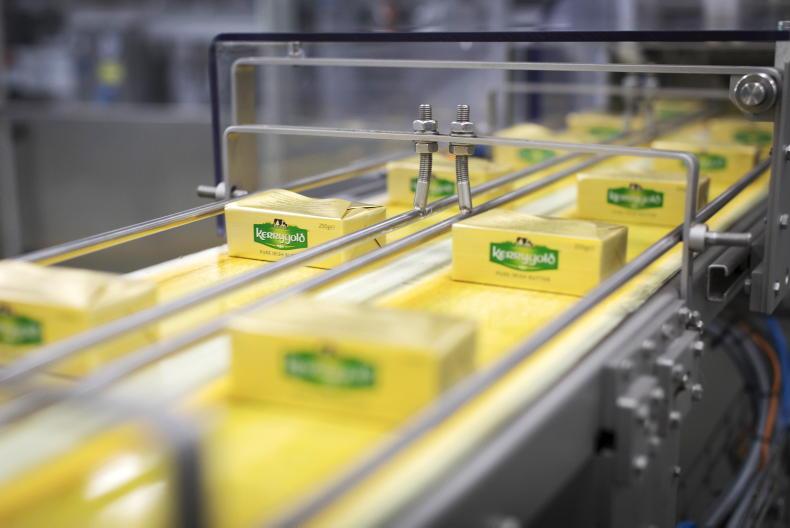Plans by the US to introduce a new 30% tariff on EU exports from 1 August will dent the competitiveness of Irish agri-food exports in the lucrative US market.
Placing a 30% tariff on imports from outside the US will essentially see a tax placed on all EU exports.
In turn, this will make exports more expensive; with costs increasing for the exporter of the product as well as the US consumer, who is buying the product off US shop shelves.
In a letter posted on Truth Social, president Trump said that “starting on 1 August 2025, we will charge the European Union a tariff of only 30% on EU products sent into the United States, separate from all sectoral tariffs. Goods trans-shipped to evade a higher tariff will be subject to that higher tariff.”
He said that these tariffs are necessary to correct the “many years of European Union tariff, and non-tariff, policies and trade barriers, which cause the large and unsustainable trade deficits against the United States”.
How important is the US market to Ireland?
Irish food and drink exports to the US were worth almost €1.9bn in 2024, with Irish butter and whiskey the two products facing the most risk.
Irish dairy worth €829m was exported to the US last year and over half of this value comprised 57,287t Irish butter exports - worth €494m.

Kerrygold Irish butter is the second most popular brand of butter in the US market.
The volume of butter exported was down 7.9% on 2023, but up in terms of value by almost 16%. Ornua’s Kerrygold butter brand is the second-most popular brand of butter in the market.
On the drinks front, Bord Bia data shows that Ireland exported Irish whiskey worth €450m to the US market last year, with the overall drinks sector last year sending alcoholic beverages worth €899m stateside. The market accounts for around 40% of Irish whiskey exports.
Irish pigmeat exports to the US grew by 40% in 2024 to reach €25m and beef worth €8.8m was sent there last year.
European Commission president Ursula von der Leyen
The president of the European Commission said that the EU takes note of the letter sent by US president Trump outlining a revised tariff rate and a new timeline.
“Imposing 30% tariffs on EU exports would disrupt essential transatlantic supply chains, to the detriment of businesses, consumers and patients on both sides of the Atlantic.
“Few economies in the world match the European Union's level of openness and adherence to fair trading practices. The EU has consistently prioritised a negotiated solution with the US, reflecting our commitment to dialogue, stability, and a constructive transatlantic partnership.

"Our preference is for a negotiated solution that avoids escalation."
“We remain ready to continue working towards an agreement by 1 August. At the same time, we will take all necessary steps to safeguard EU interests, including the adoption of proportionate countermeasures, if required.
“Meanwhile, we continue to deepen our global partnerships, firmly anchored in the principles of rules-based international trade,” she said.
Taoiseach Micheál Martin
The EU and the US enjoy the biggest trade and investment relationship in the world, An Taoiseach Micheál Martin said.
“When issues arise between us, they should be resolved through by close and respectful dialogue. The EU, through the team led by president von der Leyen and vice-president Šefcovic, has engaged in good faith to reach an agreement on a positive and balanced way forward.
“While it has been clear that all options remain on the table, the EU has also been clear that our preference is for a negotiated solution that avoids escalation. That remains the case.
“I hope that negotiations will continue in the weeks ahead and that they will be successful.
“The EU and the US should be partners, not rivals. In a true partnership, everyone wins. The EU negotiators continue to have my full support in this important work,” he said.
French president Emmanuel Macron
France shares the same very strong disapproval at the announcement of horizontal 30% tariffs on EU exports to the United States from 1 August, French president Emmanuel Macron said.
“This announcement comes after weeks of intense engagement by the commission in negotiations with the United States, on the basis of a solid offer made in good faith. With European unity, it is more than ever up to the commission to assert the union's determination to resolutely defend European interests.
“In particular, this implies speeding up the preparation of credible countermeasures, by mobilising all the instruments at its disposal, including anti-coercion, if no agreement is reached by 1 August. On this basis, France fully supports the European Commission in the negotiations, which will now intensify, to reach a mutually acceptable agreement by 1 August, reflecting the respect that trading partners like the European Union and the United States owe each other, with their shared interests and integrated value chains,” he said.
Read more
US tariff impact on Irish agriculture
China tariffs hit US exports hard in May
Nothing is final with Trump trade
Plans by the US to introduce a new 30% tariff on EU exports from 1 August will dent the competitiveness of Irish agri-food exports in the lucrative US market.
Placing a 30% tariff on imports from outside the US will essentially see a tax placed on all EU exports.
In turn, this will make exports more expensive; with costs increasing for the exporter of the product as well as the US consumer, who is buying the product off US shop shelves.
In a letter posted on Truth Social, president Trump said that “starting on 1 August 2025, we will charge the European Union a tariff of only 30% on EU products sent into the United States, separate from all sectoral tariffs. Goods trans-shipped to evade a higher tariff will be subject to that higher tariff.”
He said that these tariffs are necessary to correct the “many years of European Union tariff, and non-tariff, policies and trade barriers, which cause the large and unsustainable trade deficits against the United States”.
How important is the US market to Ireland?
Irish food and drink exports to the US were worth almost €1.9bn in 2024, with Irish butter and whiskey the two products facing the most risk.
Irish dairy worth €829m was exported to the US last year and over half of this value comprised 57,287t Irish butter exports - worth €494m.

Kerrygold Irish butter is the second most popular brand of butter in the US market.
The volume of butter exported was down 7.9% on 2023, but up in terms of value by almost 16%. Ornua’s Kerrygold butter brand is the second-most popular brand of butter in the market.
On the drinks front, Bord Bia data shows that Ireland exported Irish whiskey worth €450m to the US market last year, with the overall drinks sector last year sending alcoholic beverages worth €899m stateside. The market accounts for around 40% of Irish whiskey exports.
Irish pigmeat exports to the US grew by 40% in 2024 to reach €25m and beef worth €8.8m was sent there last year.
European Commission president Ursula von der Leyen
The president of the European Commission said that the EU takes note of the letter sent by US president Trump outlining a revised tariff rate and a new timeline.
“Imposing 30% tariffs on EU exports would disrupt essential transatlantic supply chains, to the detriment of businesses, consumers and patients on both sides of the Atlantic.
“Few economies in the world match the European Union's level of openness and adherence to fair trading practices. The EU has consistently prioritised a negotiated solution with the US, reflecting our commitment to dialogue, stability, and a constructive transatlantic partnership.

"Our preference is for a negotiated solution that avoids escalation."
“We remain ready to continue working towards an agreement by 1 August. At the same time, we will take all necessary steps to safeguard EU interests, including the adoption of proportionate countermeasures, if required.
“Meanwhile, we continue to deepen our global partnerships, firmly anchored in the principles of rules-based international trade,” she said.
Taoiseach Micheál Martin
The EU and the US enjoy the biggest trade and investment relationship in the world, An Taoiseach Micheál Martin said.
“When issues arise between us, they should be resolved through by close and respectful dialogue. The EU, through the team led by president von der Leyen and vice-president Šefcovic, has engaged in good faith to reach an agreement on a positive and balanced way forward.
“While it has been clear that all options remain on the table, the EU has also been clear that our preference is for a negotiated solution that avoids escalation. That remains the case.
“I hope that negotiations will continue in the weeks ahead and that they will be successful.
“The EU and the US should be partners, not rivals. In a true partnership, everyone wins. The EU negotiators continue to have my full support in this important work,” he said.
French president Emmanuel Macron
France shares the same very strong disapproval at the announcement of horizontal 30% tariffs on EU exports to the United States from 1 August, French president Emmanuel Macron said.
“This announcement comes after weeks of intense engagement by the commission in negotiations with the United States, on the basis of a solid offer made in good faith. With European unity, it is more than ever up to the commission to assert the union's determination to resolutely defend European interests.
“In particular, this implies speeding up the preparation of credible countermeasures, by mobilising all the instruments at its disposal, including anti-coercion, if no agreement is reached by 1 August. On this basis, France fully supports the European Commission in the negotiations, which will now intensify, to reach a mutually acceptable agreement by 1 August, reflecting the respect that trading partners like the European Union and the United States owe each other, with their shared interests and integrated value chains,” he said.
Read more
US tariff impact on Irish agriculture
China tariffs hit US exports hard in May
Nothing is final with Trump trade








 This is a subscriber-only article
This is a subscriber-only article










SHARING OPTIONS: